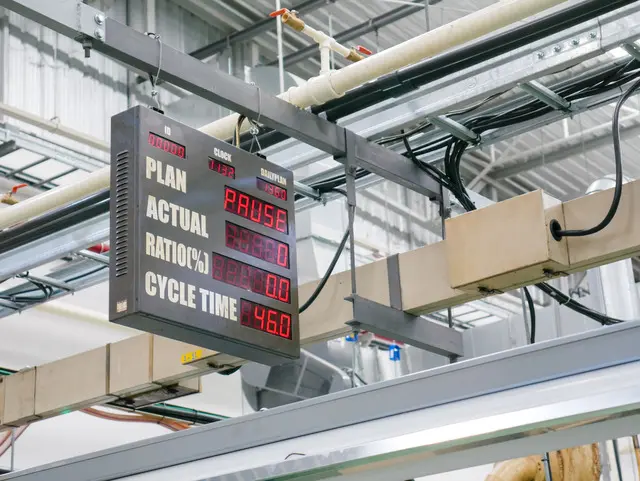Embracing Inventory Management Automation: A Lifeline for the Manufacturing Industry
In the fast-paced world of manufacturing, inventory management is a critical aspect that directly impacts efficiency, customer satisfaction, and profitability. However, manual inventory management processes are often prone to errors, delays, and inefficiencies. Inventory Management Automation emerges as a game-changer, offering a solution to these challenges and empowering manufacturers to streamline their operations.
Keyword Induction:
- Inventory Management Automation: A Critical Lifeline for Manufacturing
- Embracing Inventory Management Automation: The Path to Efficiency and Accuracy
By leveraging Python, AI, and cloud-based solutions, manufacturers can automate their inventory management processes, reducing human error, improving accuracy, and gaining real-time visibility into their inventory levels. This transformation not only optimizes operations but also unlocks new opportunities for growth and innovation.

Python, AI, and the Cloud: The Trinity for Inventory Management Automation
Python, AI, and cloud-based solutions form a powerful trinity that enables manufacturers to automate their inventory management processes with unmatched efficiency and accuracy.
Python: The Master of Automation
Python is an ideal language for developing unattended bots that can seamlessly automate repetitive tasks such as inventory tracking, reorder notifications, and material replenishment. These bots operate 24/7, ensuring that inventory levels are always up-to-date and stockouts or overstocks are minimized.
Moreover, Python’s versatility extends to attended bots, which provide real-time assistance to human workers during inventory management tasks. With Python, manufacturers can customize these bots to meet their specific needs, enhancing accuracy and streamlining workflows.
Cloud Platforms: The Orchestration Powerhouse
Cloud platforms offer a comprehensive suite of automation orchestration capabilities that far surpass traditional RPA/workflow tools. These platforms provide:
- Scalability: Cloud platforms can effortlessly handle large volumes of data and complex automation processes, ensuring seamless operations even during peak demand.
- Flexibility: Cloud platforms offer a wide range of pre-built connectors and APIs, allowing manufacturers to integrate their automation solutions with existing systems and applications.
- Security: Cloud platforms prioritize data security, providing robust measures to protect sensitive inventory information.
AI: The Edge-Case Solver
AI techniques like image recognition, natural language processing (NLP), and Generative AI (Gen AI) empower automation solutions to handle complex edge cases that traditional methods cannot. For example:
- Image recognition: AI can analyze images of inventory items, automatically identifying and classifying them, reducing manual data entry and errors.
- NLP: AI can process unstructured text data, such as purchase orders or emails, extracting relevant information for inventory updates.
- Gen AI: AI can generate natural language text or images, enabling automation solutions to communicate effectively with human users or external systems.
By leveraging the combined power of Python, AI, and cloud platforms, manufacturers can unlock the full potential of Inventory Management Automation, transforming their operations into a well-oiled machine of efficiency and accuracy.

Building the Inventory Management Automation Solution
Sub-Process Automation with Python and Cloud
The Inventory Management Automation solution involves several sub-processes, each of which can be automated using Python and cloud-based services:
- Inventory Tracking: Python scripts can be developed to periodically query inventory databases and update a central repository. Cloud platforms provide scalable storage and compute resources to handle large volumes of inventory data.
- Reorder Notifications: Python bots can monitor inventory levels and trigger notifications when stock falls below predefined thresholds. Cloud platforms offer messaging services to send these notifications via email or SMS.
- Material Replenishment: Python scripts can integrate with supplier systems to automatically place replenishment orders when inventory levels are low. Cloud platforms provide APIs and connectors to facilitate seamless integration with external systems.
- Data Entry Automation: Python bots can be used to automate data entry tasks, such as updating inventory records based on barcode scans or RFID data. Cloud platforms offer OCR and image recognition services to extract data from physical documents.
Data Security and Compliance
Data security and compliance are paramount in the manufacturing industry. Python and cloud platforms provide robust security measures to protect sensitive inventory information, including encryption, access controls, and audit trails.
Advantages of Python over No-Code RPA/Workflow Tools
Compared to no-code RPA/workflow tools, Python offers several advantages for Inventory Management Automation:
- Flexibility: Python is a versatile language that allows for customization and fine-tuning of automation scripts to meet specific business requirements.
- Scalability: Python scripts can be easily scaled to handle large volumes of data and complex automation processes.
- Cost-Effectiveness: Python is an open-source language, eliminating licensing costs associated with proprietary RPA/workflow tools.
Algorythum’s Approach: Client-Centric Innovation
Algorythum takes a different approach to Inventory Management Automation because we recognize the limitations of off-the-shelf RPA platforms. Our Python-based solutions are tailored to the unique needs of each client, ensuring optimal performance and scalability. We prioritize client satisfaction by delivering customized automation solutions that address their specific challenges and drive tangible business outcomes.

The Future of Inventory Management Automation
The future of Inventory Management Automation is bright, with emerging technologies offering exciting possibilities to enhance the proposed solution:
- IoT and Edge Computing: Integration with IoT devices and edge computing can enable real-time inventory tracking and predictive analytics, optimizing inventory levels and reducing waste.
- Blockchain: Blockchain technology can provide a secure and transparent ledger for inventory transactions, improving traceability and reducing fraud.
- Machine Learning: Machine learning algorithms can analyze historical inventory data to identify patterns and forecast future demand, enabling more accurate inventory planning.
Join the Automation Revolution
Subscribe to our blog to stay updated on the latest industry-specific automation trends and best practices. Contact our team today for a free feasibility assessment and cost estimate for your custom Inventory Management Automation solution.
Together, let’s unlock the full potential of automation and transform your manufacturing operations into a well-oiled machine of efficiency and accuracy.

Algorythum – Your Partner in Automations and Beyond
At Algorythum, we specialize in crafting custom RPA solutions with Python, specifically tailored to your industry. We break free from the limitations of off-the-shelf tools, offering:
- A team of Automation & DevSecOps Experts: Deeply experienced in building scalable and efficient automation solutions for various businesses in all industries.
- Reduced Automation Maintenance Costs: Our code is clear, maintainable, and minimizes future upkeep expenses (up to 90% reduction compared to platforms).
- Future-Proof Solutions: You own the code, ensuring flexibility and adaptability as your processes and regulations evolve.









